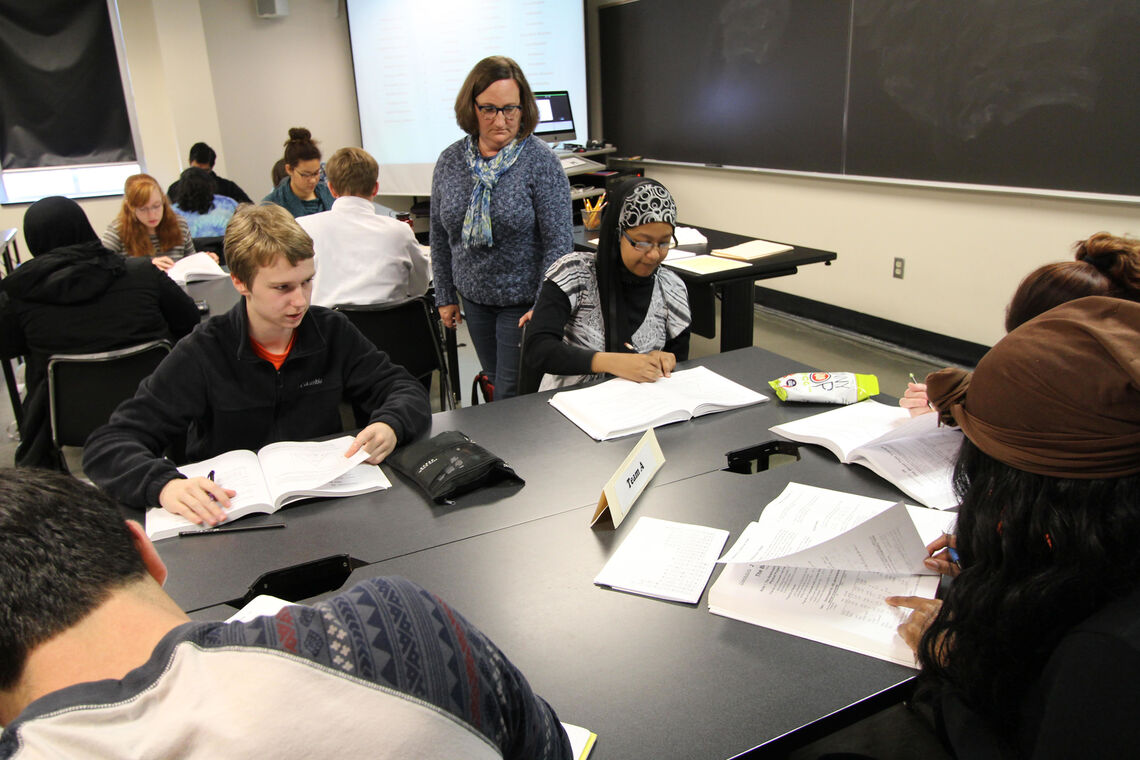Tuesday May 5th, 2016

Tammy Pirmann of Springfield Township, PA, and Tricia Shepherd of St. Edward's University, TX, Earn Inaugural Award
LANCASTER, Pa. — The POGIL Project has named two educators winners of its inaugural Early Achievement Award – Tammy Pirmann of the School District of Springfield Township, PA, and Tricia Shepherd, St. Edward's University, Austin, TX.
The award, given to one post-secondary and one secondary winner honors POGIL practitioners who are new to The Project and who have distinguished themselves by advancing the goals of The Project and who have an exceptional level of enthusiasm for active learning. Other criteria include leadership in The Project, active participation in disseminating the POGIL pedagogy, and other service to The Project, such as workshop facilitation, authorship of activities, and participation in grant proposals.
Shepherd and Pirmann will be honored at The POGIL Project's upcoming National Meeting in St. Louis in June 2016, and will each be presented with a plaque and a cash award.
"I am excited to honor these two outstanding educators as the inaugural recipients of the POGIL Early Achievement Award," said Project Director Rick Moog. "Both Tammy and Tricia have had a strong impact on the POGIL community and have contributed greatly to the growth and success of The Project."
Pirmann is the district coordinator for Computer Science and Business at the School District of Springfield Township, Montgomery County, PA, as well as a high school computer science teacher. Thanks to Pirmann and many others, Springfield has a computer science graduation requirement. Pirmann teaches Computer Science at several levels, a Robotics course, Electronic Game Design and Development, Web Application Development, Computer Science Principles, and AP Computer Science. All of her classes focus on the immediate and 'real world' application of computing concepts. She believes in the importance of teaching practical career skills in addition to the computer science content. She is an NCWIT Aspirations in Computing Educator Award winner for her work in increasing the diversity of her elective computer science courses. She is currently on sabbatical and attending Gwynedd Mercy University, working toward a Doctorate in Educational Leadership. She is also actively involved in The Project's Google Computer Science grant, which is working with a core group of high school computer science teachers to provide in-depth professional development and community support for teaching Computer Science Principles.
"I am honored to be one of the first recipients of this award," said Pirmann. "In computer science education, pedagogy is often an afterthought. I met Clif Kussmaul of Muhlenberg College many years ago and I was impressed with the research he shared with me regarding POGIL and student retention over time. I knew I had to try POGIL because I wanted those results for my students. The retention research was validated with my high school computer science students and I just couldn't keep it to myself! I've been sharing my experiences, writing activities and presenting POGIL in workshops for K-12 CS teachers at every opportunity. The peer interactions and focus on processes that are foundational to POGIL are critical in the computer science classroom. Too often students who are drawn to computer science do not see the value in learning how to work in a team. POGIL activities allow students to practice their professional skills on dimensions that are not often seen in a typical high school classroom."
Shepherd is Professor and Department Chair of Chemistry at St. Edward’s University. She received a B.S. and M.S. in Chemistry from the University of Idaho and a Ph.D. in theoretical physical chemistry from Georgia Institute of Technology. In 2014, she moved to St. Edward’s University after being a Professor of Chemistry at Westminster College in Salt Lake City Utah for 12 years. She teaches courses in general chemistry, physical chemistry and scientific computing using a guided-inquiry approach that emphasizes active, collaborative, student-centered learning. For the past 12 years she has been implementing and writing Process Oriented Guided Inquiry Learning (POGIL) activities and is the author of Quantum Chemistry & Spectroscopy: A Guided Inquiry (a set of endorsed POGIL activities). She leads workshops offered nationwide on both facilitating POGIL in the classroom and incorporating theoretical and computational chemistry into the undergraduate chemistry curriculum. Her research efforts with undergraduates involve the use of coarse-grained molecular dynamics simulations to study aqueous systems at the nanoscale. She is a member of MERCURY (Molecular Education and Research Consortium in Undergraduate computational chemistRY) and advocates for the use of technology in meaningful ways to enhance student learning.
“I’m truly honored by this recognition and thankful for all my older wiser POGIL friends who have encouraged me to present, write, and lead others through a process based guided inquiry trajectory I enjoy facilitating for students in every class I teach," said Shepherd.